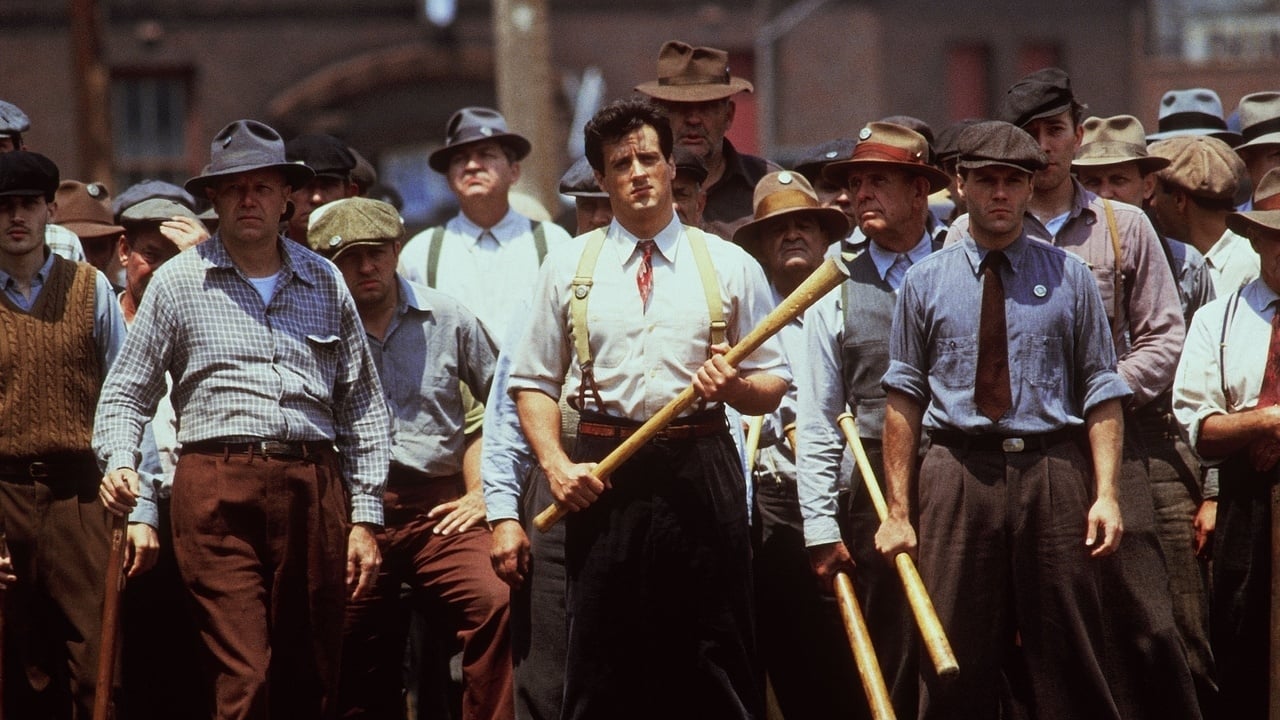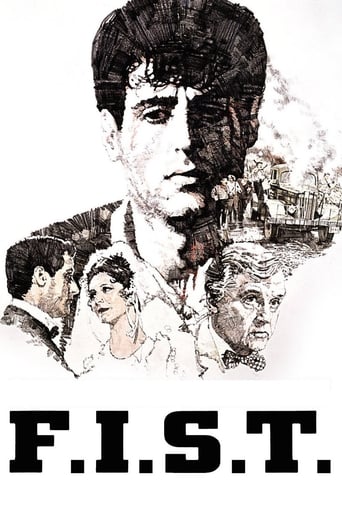



A brilliant film that helped define a genre
The biggest problem with this movie is it’s a little better than you think it might be, which somehow makes it worse. As in, it takes itself a bit too seriously, which makes most of the movie feel kind of dull.
View MoreThe movie turns out to be a little better than the average. Starting from a romantic formula often seen in the cinema, it ends in the most predictable (and somewhat bland) way.
View MoreAll of these films share one commonality, that being a kind of emotional center that humanizes a cast of monsters.
View MoreSylvester Stallone was my childhood idol, mostly thanks to 'Rocky' and 'Cliffhanger' and his other action movies. It was later when I learned that the man had penned the screenplay of 'Rocky' (and some other movies) himself, and he also directed, and I thought, that is cool. Some time along the way I started to notice that Stallone is much more than a action hero - he is very good actor (and also writer). So, now I had the opportunity to see 'F.I.S.T.' - which was Stallone's first film after Rocky fame, and he also co-wrote the screenplay. The film might be a little boring to those who are used to see Stallone kicking ass, as it is serious drama about simple man's rise to the leader of labor union. The film is little slow and flawed at times, but Stallone gives one helluva performance as Johnny Kovak. Especially the first part of the film. In the later half, when Johnny Kovak is already an older man Stallone's limits as an actor start to shine through, as he occasionally goes pretty hammy. Nonetheless, still thoroughly enjoyable performance, and totally different than Rocky.'F.I.S.T.' is definitely recommended to those who are more interested in different sides of legendary action hero who has some real artist hidden under those muscles.
View MoreOne of the best Stallone films set in the 1930s in which gives a good performance as a worker who joins the Teamsters trade-union in a local factory and being accompanied by a fine supporting cast . It deals with a love between a man, a country, the people he led and the woman he loved . Johnny Kovak (Sylvester Stallone) is an employee who works his way up as organizer and leader of Federation Interstate Truckers . Meanwhile he falls in love and marries a worker (Melinda Dillon) . As he climbs higher and higher thanks his connection with the Mob (Tony LoBianco). As his methods become more corrupt and ultimately senator Madison (Rod Steiger ) begins a campaign to discover the truth about his allegedly greedy practices .This poignant film packs emotion , thrills , a love story political events and being quite entertaining though contains some ,predictable moments and cliché-ridden . The picture details biographic events about an Union leader , Jimmy Hoffa-lookalike, from his starts until his fall . Jewison cast some largely known actors as Sylvester Stallone , Melinda Dillon , Peter Boyle and a remarkable support cast as Richard Herd , Tony LoBianco , Peter Donat , Kevin Conway, Cassie Yates , Richard Herd and the veteran Henry Wilcoxon and several others . Stallone , also screenwriter along with Eszterhas creates an even more interesting character than Rocky Balboa . Atmospheric musical score including moving sounds by Bill Conti and appropriate cinematography by excellent cameraman Laszlo Kovacs.The motion picture is well produced and directed by Norman Jewison . He is a prestigious and veteran filmmaker, his greatest film is of course Jesus Christ Superstar . He directed successful movies as Fiddler on the roof , Agnes of God , Moonstruck , Thomas Crown and Cinncinati Kid . However , he also got some flops as Bogus, In country , Only you and Other's people money and his last picture titled The statement . He considers The Hurricane (1999) the last in a trilogy of racial bigotry movies he's realized, the first two being In the Heat of the Night (1967) and A Soldier's Story (1984). Rating : Good, worthwhile seeing for its epic moments and thought-provoking issues .
View MoreNorman Jewison mangles history with "F.I.S.T", a simplified retelling of the life of Jimmy Hoffa. Like certain mainstream directors (Spielberg, Kramer, Zwick, Stone, Kazan, Joffe, Sayles), Jewison has a habit of making self important message movies which pretend to be about big, weighty topics (race, slavery, holocaust, racism, politics etc), but which completely avoid or deal superficially with the issues at hand. Here Jewison has actor Sylvester Stallone (who co-wrote the screenplay) star as Johnny Kovak, a blue collar worker who inspires other working class men to organise, unionize and stand up against exploitation.The film charters Kovak's rise through the union ranks, until he reaches a position of power. With this power comes corruption, the film's union leaders eventually becoming as greedy as those they fight against. Oddly, the film focuses on Teamsters and truckers, the one labour force that even today retains some semblance of individualism, relatively insulated from capital's encroachments.Like most of these films ("Blue Collar", "Matewan", virtually every Hollywood "slave revolt" movie etc), "F.I.S.T" quickly runs away from actual labour. The structure of labour is avoided in favour for delving into corruption, the implication being that work is fine, so long as your boss is nice, doesn't beat you and pays well.Politics are thrown out the window as well. "Bolsheviks? What are they?" Stallone asks, the film ignoring the vast communist contributions to the formation of unions and the organisation of the working class (something Sayles, Loach and Rosi get right). As the "C-word" is ignored, an important part of Hoffa's history – his purging of all communists and Trotskyists – is likewise wiped away.What the film does get right is the corruption which soon infected big unions. By the time they had gained a foothold, most of the unions became as corrupt as any other US institution, loose federations of unions quickly becoming tightly controlled, centralised domains. Partially as a response to this, mega-businesses then turned to offshore, outsourced labour. Aesthetically the film is all over the place. Though gorgeously shot by the legendary Laszlo Kovacs, Jewison's tone is customarily unsophisticated. This is a film of mouthpieces, cardboard cutouts and an obvious, reductive plot. The acting is likewise mostly dead, especially Stallone. Stallone specialises in working-class roles, fantasies about escaping the working class whilst pretending that you've never left it behind. Here his character calls for an intelligence (or rather, a street smarts) which he can't quite manage. "F.I.S.T's" narrative trajectory is "Rocky's" 1 and 2 combined, but it requires a triple digit IQed hero. Stallone may be smart, but he can't act smart. His Johnny Kovak doesn't convince.Ultimately, depressingly, "F.I.S.T's" a film about the working class betraying itself. It neglects, however, the causes of self betrayal. The implication therefore is that if one were to remove corrupt individuals from unions, then one would have healthy unionism. And with healthy unionism, it is then assumed, one would have healthy capitalism. What you're stuck with, therefore, is a kind of early Marxism; the conservative slogan "A fair day's wage for a fair day's work", which Marx himself long replaced with "Abolish the wages system." Beyond this, what is needed are not films which charter historical and class movements, but those that delve into the drives and unconscious currents which perpetuate these problems. It's no point overthrowing power if you merely take its place. Or, to paraphrase a famous slave owner, "the white man didn't subject the African to depravity, he beat him to it."7.5/10 - Great directors know how to approach topics tangentially. Once you start preaching, your art immediately becomes obvious and reductive. Some films which get away with similar preaching: "Matewan", "Burn!", Wajda's "Man of Iron" and Francesco Rosi's "The Mattei Affair" and "Lucky Luciano". Otherwise you have the neorealists. David Mamet's "Hoffa" - very similar to this film - was released in 1992.Worth one viewing.
View MoreDuring the depression, unions were important, being that there weren't many and workers were exploited. And that's what this movie shows from the first minute to the last, all within a two-and-a-half hour epic that needed more humanity than plot: that is, the moments between the strikes and hardships were too few and far between, never really getting to know the characters as actual people.Sylvester Stallone, fresh from his breakthrough in ROCKY, is hit-or-miss. His sometimes mumbling, other times voracious character moves up the ladder, from put-upon factory worker to spokesman for a trucker's union, way too fast. And the side-characters, including Peter Boyle and Rod Steiger, serve only as fuel to entice or enrage Stallone: who's fighting for a real cause... but it's all too heavy, and goes on way too long, to be genuinely effective.
View More